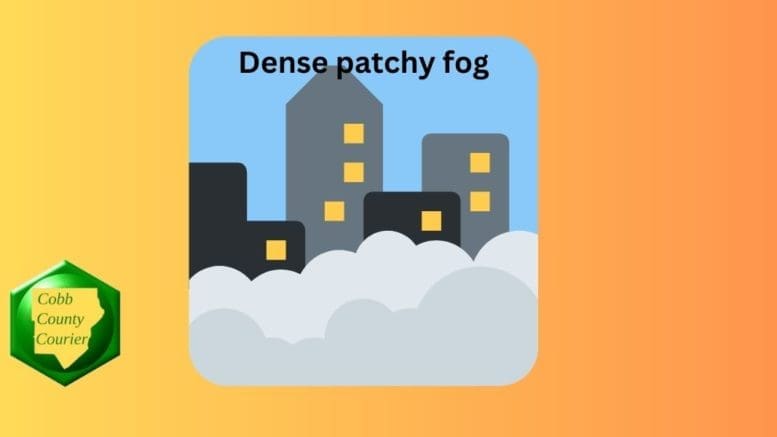The National Weather Service issued a patchy dense fog advisory for Cobb County and other north Georgia counties on Monday, September 30.
The advisory is in effect until 9 a.m.
What is in the statement?
The statement gives the following details:
This Hazardous Weather Outlook is for portions of North and Central Georgia.
.DAY ONE…Today and Tonight…
Patchy dense fog is possible in northwest Georgia through 9 AM
this morning.
Areas of river flooding will continue along the Flint, Ocmulgee,
Ohoopee and Oconee rivers in central Georgia.
.DAYS TWO THROUGH SEVEN…Tuesday through Sunday…
Areas of river flooding will continue through midweek along
portions of the Flint, Ocmulgee and Oconee rivers.
What counties are affected?
The following counties are included in the hazardous weather outlook:
Baldwin, Banks, Barrow, Bartow, Bibb, Bleckley, Butts, Carroll, Catoosa, Chattahoochee, Chattooga, Cherokee, Clarke, Clayton, Cobb, Coweta, Crawford, Crisp, Dade, Dawson, DeKalb, Dodge, Dooly, Douglas, Emanuel, Fannin, Fayette, Floyd, Forsyth, Gilmer, Glascock, Gordon, Greene, Gwinnett, Hall, Hancock, Haralson, Harris, Heard, Henry, Houston, Jackson, Jasper, Jefferson, Johnson, Jones, Lamar, Laurens, Lumpkin, Macon, Madison, Marion, Meriwether, Monroe, Montgomery, Morgan, Murray, Muscogee, Newton, North Fulton, Oconee, Oglethorpe, Paulding, Peach, Pickens, Pike, Polk, Pulaski, Putnam, Rockdale, Schley, South Fulton, Spalding, Stewart, Sumter, Talbot, Taliaferro, Taylor, Telfair, Toombs, Towns, Treutlen, Troup, Twiggs, Union, Upson, Walker, Walton, Warren, Washington, Webster, Wheeler, White, Whitfield, Wilcox, Wilkes, Wilkinson
What precautions should you take when driving in fog?
The National Weather Service provides several recommendations for safe driving in foggy conditions to help ensure your safety and the safety of others on the road. Here are some general guidelines:
- Slow Down: Reduce your speed and leave plenty of space between your vehicle and the one in front of you. Fog can reduce visibility, so it’s important to give yourself more time to react to unexpected obstacles or situations.
- Use Low Beams: Always use your low beam headlights when driving in fog, as high beams can reflect off the water droplets in the fog and reduce visibility further.
- Use Fog Lights: If your vehicle is equipped with fog lights, use them in addition to your low beam headlights to help improve visibility close to the ground.
- Defrost and Demist: Use your vehicle’s defroster and windshield wipers to keep the windshield clear of moisture and condensation.
- Stay in Your Lane: Stay in your lane and use road markings as a guide to maintain proper alignment on the road.
- Avoid Passing: Avoid passing other vehicles in heavy fog, as it can be challenging to judge distances accurately.
- Listen for Traffic: Roll down your window and listen for traffic sounds, such as the sound of approaching vehicles or sirens.
- Use Your Turn Signals: Signal your intentions well in advance, so other drivers have time to react.
- Increase Following Distance: Allow for a greater following distance than you would in clear conditions. This extra space gives you more time to react if the vehicle in front of you stops suddenly.
- Stay Informed: Listen to local weather reports or use a weather app to stay updated on fog conditions in your area. Consider delaying your trip if visibility is extremely poor.
- Be Cautious at Intersections: Approach intersections with caution and be prepared to stop. Other drivers may not see you or may not stop in time.
- Avoid Using Cruise Control: Turn off cruise control when driving in fog. You want to have full control over your vehicle’s speed at all times.
- Pull Over if Necessary: If visibility becomes extremely poor and you feel unsafe, consider pulling over to a safe location, such as a parking lot or rest area, and wait for the fog to lift.
Remember that fog can vary in density and visibility can change rapidly, so it’s essential to stay alert and adapt your driving to the current conditions. Your safety and the safety of others should always be your top priority when driving in foggy weather.
About the National Weather Service
The National Weather Service (NWS) is a part of the National Oceanic and Atmospheric Administration (NOAA).
The NWS describes its role as follows:
“The National Weather Service (NWS) provides weather, water, and climate forecasts and warnings for the United States, its territories, adjacent waters and ocean areas, for the protection of life and property and the enhancement of the national economy.
“These services include Forecasts and Observations, Warnings, Impact-based Decision Support Services, and Education in an effort to build a Weather-Ready Nation. The ultimate goal is to have a society that is prepared for and responds to weather, water and climate events.”
>>> Read all the Cobb County Courier climate and weather coverage by following this link.
